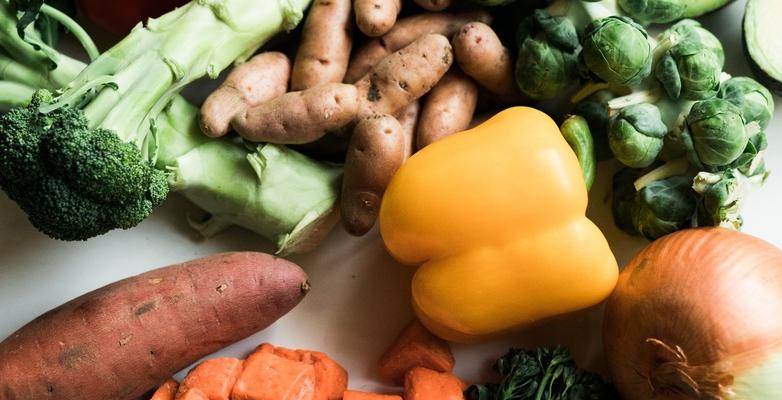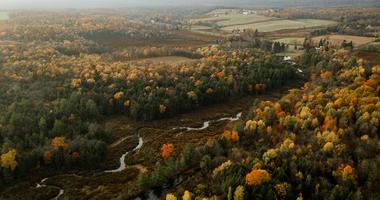
Will Climate Change Turn Us Into Junk Food?
If we are what we eat, then rising temperatures are (yet again) bad news.
You don't have to look far to see how climate change is already transforming our global food systems. Climate-fueled droughts have fast become one of the greatest threats to food security worldwide. Rising temperatures are redrawing the map of growing zones and what grows where. The list goes on.
But what is only starting to get mainstream attention is how the climate crisis will also impact how nutritious our food is – and who can access the nutrients we all need to thrive. Literally, what's in our food.
Inspired by the Academy of Nutrition and Dietetics choice of March as National Nutrition Month – with the theme of “Fuel for the Future” – here are a few ways that the climate crisis is impacting how we nourish our bodies.
CLIMATE CHANGE CAN IMPACT THE NUTRIENT CONTENT OF OUR FOOD
It goes without saying that nutrition is a vital part of human health and development. Adequate nutrition has numerous benefits, including better “infant, child and maternal health, stronger immune systems, safter pregnancy and childbirth, lower risk of non-communicable diseases, and longevity.”
However, the combination of rising temperatures and rising greenhouse gas emissions together can reduce the level of vital nutrients in our food and lead to serious deficiencies.
Plants need CO2 to grow but there is such a thing as too much of a good thing. There is now evidence that rising CO2 levels have an adverse effect on the nutritional value of most food crops and may “reduce the concentrations of protein and essential minerals in most plant species, including wheat, soybeans, and rice,” according to a 2016 study by the US Global Change Research Program (USGCRP). Research from 2018 indicates that as a result of higher emissions, 175 million people could become zinc deficient and 122 million people could become protein deficient by 2050.
According to research led by Sam Myers, a principal scientist at the Harvard T.H. Chan School of Public Health, staple crops exposed to CO2 levels predicted for 2050 can lose as much as “10% of their zinc, 5% of their iron, and 8% of their protein content.”
This doesn’t bode well for any of us – especially communities already suffering from malnutrition. These nutrients play a critical role in how our bodies function and not having enough can have devastating consequences.
Zinc plays an important role in helping our bodies fight off bacteria and viruses and make DNA. The body also needs zinc during “pregnancy, infancy, childhood, and adolescence” in order to grow and develop, according to the National Institutes of Health.
Iron – which is also essential for the immune system – is utilized by the body to make hemoglobin, a protein found in red blood cells. Red blood cells assist in carrying oxygen throughout the body. Among many other uses, protein helps make and repair cells and can be found in nearly every part of the body.
“Our research makes it clear that decisions we are making every day—how we heat our homes, what we eat, how we move around, what we choose to purchase—are making our food less nutritious, and imperiling the health of other populations and future generations,” Myers said.
NUTRITION AS A CLIMATE JUSTICE ISSUE
It's not just about nutritious crops inching closer to junk food. The climate crisis also impacts who can access nutritious food – and who will suffer the consequences of undernutrition.
“As climate change affects the ability to move food from production to markets, access to diverse, high-quality diets may become more limited,” according to an article published in the journal Global Food Security. “Reduced access to sufficient nutrient-dense foods will subsequently lead to impaired nutritional status and diminished resiliency, particularly in low-income communities.”
It makes sense: wealthier communities worldwide have and will have better access to high-quality foods. Meanwhile low-income communities will be harder hit by a wide range of projected impacts including increasing staple food prices, conflicts fueled by resource scarcity, the rise of pests, and the decline of safe water and sanitation systems.
Cruelly, experts project that developing countries already bearing the brunt of extreme weather and often suffering from poverty and hunger will feel the greatest pain here.
“Low-income and middle-income countries (LMICs) in Africa and Southeast Asia will experience the largest reductions in food availability, leading to both decreased deaths attributed to overweight and obesity and increased deaths attributed to underweight,” according to an article published in Nature Reviews Disease Primers.
This is not just about the future. Right now, as a result of drought, conflict, and the rise of disease, the Horn of Africa is experiencing extreme hunger with nearly 50 million facing “crisis levels of food insecurity” while millions of children under five are considered acutely malnourished.
The threat is real in wealthy nations, too. In the US, nearly 34 million people are food insecure, according to the Department of Agriculture. Communities of color and low-income communities – and especially households led by single parents – are more likely to be at risk for food insecurity and undernutrition.
HOW YOU CAN HELP
What we know is this: fossil fuels and climate change have made the complex challenges of hunger and nutrition infinitely harder and caused immense suffering for millions. But a future of junk food and growing hunger is not locked in. End our fossil fuel addiction and we take a big step closer to a better tomorrow for all of us.
If there is a silver lining here, it's this: we have the tools to do it. In our hands today. If you're in the US, there's never been a better time to get started, thanks to all the incredible programs and incentives in new climate laws like the Inflation Reduction Act and Bipartisan Infrastructure Law.
Learn what these laws can do for you and how you can make a difference by joining former Vice President Al Gore and a stellar lineup of White House and government leaders and experts for a free online training, Power Up: From Acts to Action, starting April 6.




